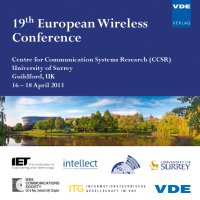Performance Evaluation of Reduced Power Inter-cell Interference Coordination for Downlink in LTE-Advanced Heterogeneous Networks
Konferenz: European Wireless 2013 - 19th European Wireless Conference
16.04.2013 - 18.04.2013 in Guildford, UK
Tagungsband: European Wireless 2013
Seiten: 6Sprache: EnglischTyp: PDF
Persönliche VDE-Mitglieder erhalten auf diesen Artikel 10% Rabatt
Autoren:
Morimoto, Akihito; Miki, Nobuhiko; Okumura, Yukihiko (NTT DOCOMO, INC., 3-6 Hikari-no-oka, Yokosuka-shi, Kanagawa-ken, 239-8536 Japan)
Inhalt:
In Long-Term Evolution (LTE)-Advanced, heterogeneous networks are important to improve further the system throughput per unit area. In heterogeneous network deployment, low power nodes such as picocells are overlaid onto macrocells. In the downlink, the combined usage of inter-cell interference coordination (ICIC) that reduces the severe interference from macrocells and cell range expansion (CRE) that increases the offloading effect to picocells is very effective in improving the throughput performance. This paper investigates the impact of the reduction in the transmission power and the restrictions on the modulation scheme when using ICIC, which reduces the transmission power from the macrocell (referred to as reduced power (RP)-ICIC), on the user throughput performance. Simulation results show that the user throughput employing RP-ICIC is not sensitive to the protected subframe ratio compared to that employing ICIC, which stops the transmission from the macrocells (referred to as zero power (ZP)-ICIC), even if the modulation scheme is restricted to only QPSK in the protected subframes. This indicates that RP-ICIC is more robust than ZP-ICIC for a non-optimum protected subframe ratio. Keywords — LTE-Advanced, heterogeneous network, inter-cell interference coordination, cell range expansion


